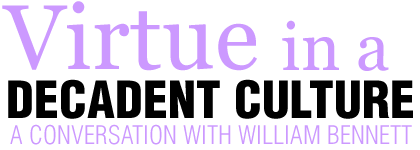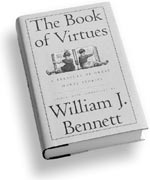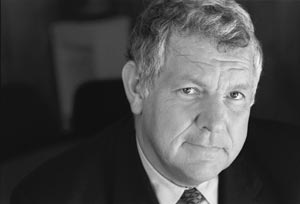Interview by Connie McDougall
Photos by Jim Lott and Michael Caulfield/AP
![]()
![]()

S E A T T L E P A C I F I C U N I V E R S I T Y hosted its fifth annual Greater Seattle Community Breakfast on Wednesday, April 4, 2001. Held at the Sheraton Hotel in downtown Seattle, the event attracted nearly 900 business and community leaders. One of the highlights was the address by keynote speaker William Bennett.
 Secretary of education for President
Ronald Reagan, and "drug czar" for President George Bush, the outspoken
Bennett is perhaps best recognized as a frequent talk show guest and
best-selling author. Among his most popular books are The Book of
Virtues, The Children's Book of Virtues and
The Death of Outrage:
Bill Clinton and the Assault on American Ideals. His most recent books
are The Educated Child and The Children's Book of Faith.
Secretary of education for President
Ronald Reagan, and "drug czar" for President George Bush, the outspoken
Bennett is perhaps best recognized as a frequent talk show guest and
best-selling author. Among his most popular books are The Book of
Virtues, The Children's Book of Virtues and
The Death of Outrage:
Bill Clinton and the Assault on American Ideals. His most recent books
are The Educated Child and The Children's Book of Faith.
With an undergraduate degree in philosophy from Williams College, Bennett went on to earn a Ph.D. in political philosophy from the University of Texas, as well as a law degree from Harvard. He is a fellow at the Heritage Foundation and co-director of Empower America, an organization that seeks to influence public policy through various means, including the sponsoring of debates and forums. Bennett is also the founder and chairman of K12, an Internet-based education company.
Response writer Connie McDougall recently spoke with Bennett on a range of subjects:
Q: You have written about "virtues." Are virtues the same as "values"?
A: I say no. I prefer the term "virtues" to "values." That's why I called it The Book of Virtues. I sent my manuscript of this book off, and somebody said, "I like your book of values," and I said, "It's not the book of values; that's the Sears catalog, or the Wal-Mart catalog. This is the book of virtues, which is about strength of character, aspects or elements of character that are admirable."
Values can be good or bad. Virtues are always good. We should aspire to virtues. I'm talking now partly about the way the word is used. People say on the Jerry Springer Show, "Well, those are my values." The other day I heard on TV an absolutely horrible person, who was doing horrible things to other people, say, "Well, those are my values. And I have a right to be me." That's why I like to avoid the word "values."

"Our music should be more soothing. Our public discourse should be more bracing." - William Bennett
Q: You've said — and I'm quoting from various interviews — that "virtue is about strengthening the character of the young." In fact, the subject of your address at the SPU breakfast was "the education of character." Why is this important?
A: What I heard from responsible adults in both my job as secretary of education and my job as drug czar was pretty much the same message: We need to attend to the character of the young. We need to attend to the culture and to the messages that the culture is sending to the young. To make sense of the world in which we live; to say what is important; to talk about what deserves to be loved, what deserves to be defended, and what deserves to be avoided or disdained — this is the responsibility of every adult for the sake of the next generation.
It is most encouraging to find a university like Seattle Pacific that is unembarrassed to say, "This is what we are about. We seek to engage this issue and the culture, and to talk to our students about character."
Q: What is this thing we call "character?"
A: Well, this thing we call character is based on the Greek. It means "marks." It is the marks of a man or woman. It is those attributes which we admire, which are worth admiring: worthy marks of a person's soul.
Q: One thing that seems to complicate the education of character is prosperity. You've said that prosperity contributes to the lack of moral anchors in this country. Do you still believe that's true?
A: I think there are a lot of things responsible for the moral drift, but that's certainly one of them. Lately I've been been asked to talk often about the whole question of wealth and character, and the concerns people have when the economy explodes. Things are going well, people are making a lot of money — I think that's still the case, even with the downturn — so what effect does this have on our character as a people? There's an uneasiness that with having so much perhaps we've forgotten some of the more important things.
This is not a thought original to me. The New Testament is full of warnings about riches and wealth. There are more warnings about riches and wealth than anything else in the New Testament. That's something that I've asked some very wealthy Christians about, and we've had some some very interesting discussions.
It's certainly not a problem to be wealthy, but it's clearly a very serious temptation. Or, as we'd say in the Catholic faith, an "occasion of sin." I believe it was [Colonial preacher] Cotton Mather who said, "Virtue begat prosperity, and the daughter killed the mother."
Q: Yet Americans are falling all over themselves trying to get more money. It's an irony, isn't it?
A: Yes. I think the distinction is between acquisitiveness and greed. Greed's a sin in my church. It's a capital sin, one of the seven capital sins. Acquisitiveness is not a sin. That is, to try to improve one's life and one's situation for your family, for charity, for those around you, for your community — it's fine. And I think you can make a very strong case that hard-working people who make a lot of money, do, in fact, produce jobs; do produce an economy that gives more opportunity. The growth of the black middle class in the '70s and '80s was much more about the economy and capitalism than all the give-away government programs there were. So there's something to strongly recommend democratic capitalism. Michael Novak has written extensively on this.
At the same time, we are to be reminded — those of us who are Christians — of what matters most, and money is not what matters most.
Q: SPU uses the phrase "engaging the culture and changing the world" to describe its vision and priorities. That's a lofty phrase, but we hope it has meaning for people outside our campus.
A: It means a lot to me.
Q: Yes, it dovetails with much of what you write about. How would you interpret the phrase "engaging the culture," and what does it mean in practical terms?
A: Engaging the culture — I think I spend about half my time engaging the culture. Everything from movies and television, to what's on the radio, to what's being taught in schools. And I think one has to engage the culture. We are to be salt and light, and that means in the culture.
Flannery O'Connor, one of my favorite writers, says you have to push as hard as the age that pushes against you. And the current age is pushing very hard. Look at the anguish in light of the recent school shooting in California, in San Diego. Look at the modern temperament's response to it: "Well, it's kids being bullied. And, gee, he didn't feel well and he was kinda down. And he was taking some drugs and, you know, drinking some. What are we going to do?" There's a kind of throwing up of our hands.
What do we think will happen in a culture like this where kids have access to all sorts of dangerous things? Things that they can eat and drink and smoke that can destroy them. Weaponry that's at their disposal, in an age that isn't clear about the difference between right and wrong.
Q: You are big on personal responsibility, yet you're saying this young man, and other people who have committed such acts, are influenced heavily by all these externals. Can you have it both ways?
A: Well, that's a good question. It's the old Kantian question about heteronomy and autonomy: Can we be self-legislating and be influenced by others? Look, my children are responsible for what they do. But I take a major responsibility for the influences that surround my children. There's such a thing as temptation, and it's very important to try to keep those hard ones to a minimum. ... We have free will, but we are also human and we can be subjected to influences that can destroy our capacity to reason and to make decisions. So, yes, we are free, but we are deeply influenced by what's around us as well.
Q: I saw you on Larry King recently and the subject was the Clinton pardons. I wrote down a list of things that you said about the Clintons because I was surprised about how personal they seemed. Let me read you some of the things you said. You said, "This is a corrupt man." "The Clintons are a disgrace." "They are despicable people." "They are a terminally unethical couple."
A: That's not personal. That's all on the record. I mean, I barely know Mrs. Clinton. I know President Clinton a little bit.
They're strong words, but they're not personal. They're words I can support in any forum. By the way, I was quoting — on purpose, because I knew I'd be asked this question — Bob Herbert of the New York Times, who is a liberal columnist. He wrote that very day that this is a terminally unethical and vulgar couple who have betrayed everyone who's ever believed in them.
Q: But my question is, does this kind of language add to the foment? How does it jibe with virtues such as compassion, civility and grace?
A: There's nothing uncivil about what I've said. And I have a great deal of compassion for Bill Clinton's victims. I'm prepared to have compassion for him when he does the right thing, when he comes forward and really has repentance. But you can't have repentance if you haven't laid out what you've done. Everybody's giving him what Bonhoffer calls "cheap grace." But I'm not prepared to do that. ...
Foment doesn't bother me. I mean, there are some fights worth being in, and this is one that's worth being in. And we now, finally, have a chance to make the right judgment as a people about this man. It's very important what judgment we make because children are listening.
Q: You have said that you don't like being set up as some paragon of virtue just because you have written about the subject. Don't comments like those you've made about the Clintons set you up as somewhat of a target, fairly or not?
A: I'm a huge target.
Q: You don't seem afraid of it. Why doesn't it hurt your feelings?
A: Probably three reasons. One, this is not my end journey. I'm going somewhere else when this is all over. As we all are. And this life, this earth, is not my ultimate destination. I hope to do it right, and I'll be in Heaven when it's over. Certainly my family will be there. I hope to join them.
Second, I was a tackle in football; I'm used to getting hit in the head 15 times a day. You know, if I don't, it doesn't seem right. And third, it may be the Irish, you know? There's a great joke about the Irish. Someone said, "This made me think of you, Bennett." Then he said to me: "A guy walks down the street and says, 'Is this a private fight, or can anybody get in on it?'" So there may be some dispositional aspects to it. ...
It's funny, you know. We have the most vulgar and horrible and corrupt and absolutely decadent culture out there where people say anything and do anything. And everybody just accepts it. But when you speak publicly and clearly and unambiguously about politics or political figures, people are shocked. Our music should be more soothing. Our public discourse should be more bracing.
Editor's Note: Click here to read the full transcript of this year's Greater Seattle Community Breakfast. Additionally, a limited number of free videotapes of the beakfast are available for the Response readers. To request a video, printed transcript or e-mail transcript, e-mail response@spu.edu or call 206/281-2051
![]()

| Please
read our
disclaimer.
Send any questions, comments or correspondence about Response to
jgilnett@spu.edu or call 206-281-2051. Copyright © 2001 University Communications, Seattle Pacific University.
Seattle Pacific University |